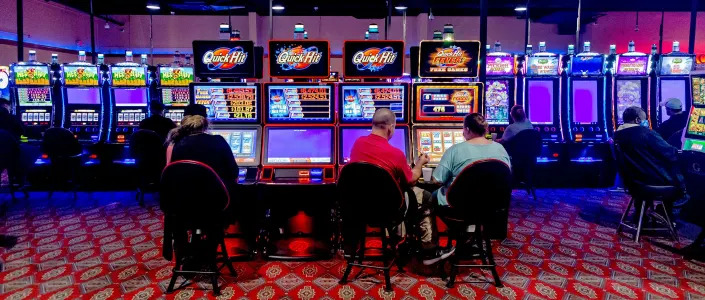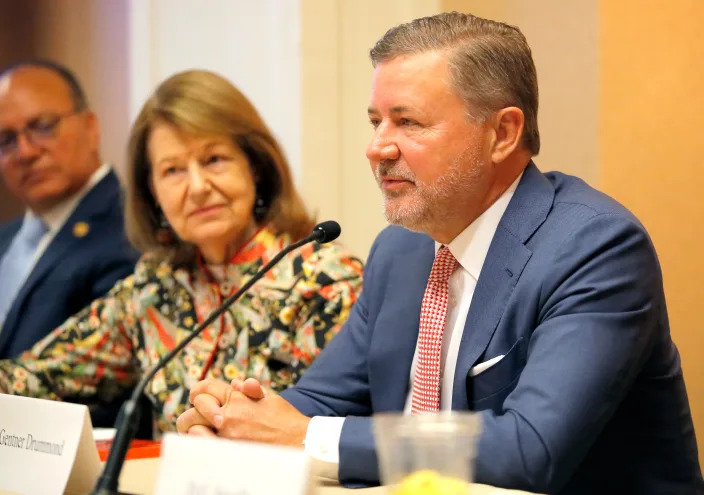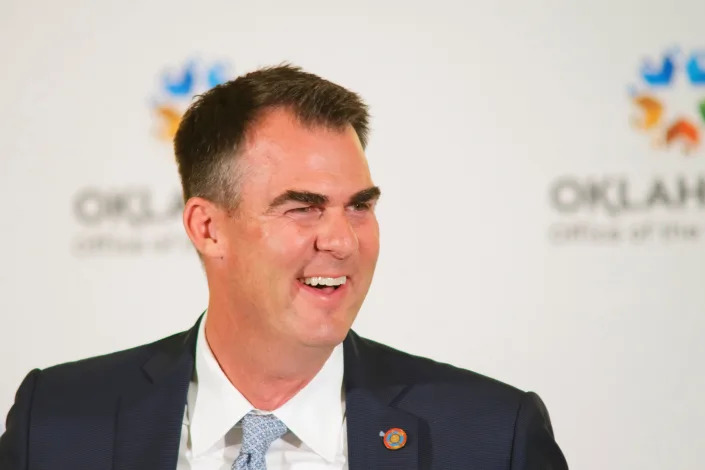Molly Young, Oklahoman
Tue, July 18, 2023

Oklahoma's tribal gaming industry paid the state $200 million in exclusivity fees over the last year ending in April. A central agreement between the state and tribes, known as the model gaming compact, spells out how much tribal gaming operations must pay in exchange for exclusive gaming rights in Oklahoma.
Oklahoma Attorney General Gentner Drummond wants to take the lead in representing the state in a long-running tribal gaming lawsuit. But Gov. Kevin Stitt’s office says he has no plans to hand over the reins.
Drummond called defending the federal suit a “waste of state resources” and asked for approval to enter the ring and end the case in a June 16 letter to legislative leaders. Stitt’s general counsel told lawmakers in his own July 11 letter that Drummond has no standing.
The legal dispute is the latest clash among Oklahoma’s top elected officials over tribal relations.
Stitt has had rocky relationships with many tribal governments since 2019, when he challenged the central state-tribal gaming compact as unfair. Drummond took office in January and has often split from Stitt on key issues involving tribes, which he has described as economic engines for the state.
Both contend their approach to the federal lawsuit is what’s best for Oklahoma.

Oklahoma Attorney General Gentner Drummond said in June that he has spent many hours meeting with tribal leaders during the first months of his four-year term, which started in January.
More: Oklahoma tribes urge lawmakers to override governor's latest veto
What to know about the case, and the gaming compacts in Oklahoma
The case currently centers on the legal standing of standalone gaming compacts the governor negotiated with the Comanche and Otoe-Missouria nations. Four other tribes with sizable gaming arms — the Cherokee, Chickasaw, Choctaw and Citizen Potawatomi nations — sued in 2020 to stop the agreements from taking effect outside the model gaming compact.
The model gaming compact sets the framework for Las Vegas-style gaming in Oklahoma and gives tribes exclusive rights to operate those facilities in exchange for paying the state a specific cut of revenues. Oklahoma collected $200 million through the agreement from May 2022 through April.
Oklahoma’s highest court ruled the outside compacts signed by Stitt were invalid. Federal gaming regulators did not directly reject the deals, though, which has prompted the legal fight over their future.
The governor clearly acted outside state law when he signed the deals on behalf of the state, Drummond said in his letter. “The Oklahoma Legislature did not approve of or authorize Governor Stitt to bind Oklahoma to these compacts,” Drummond wrote.
His letter to lawmakers was first reported by the online news outlet NonDoc and later provided to The Oklahoman by the attorney general’s office. It was addressed to House Speaker Charles McCall and Senate President Pro Tem Greg Treat. Drummond wrote that he believed legislative sign-off would give him the strongest argument to enter the case on Oklahoma’s behalf.
More: A law pressured tribes to give up land in 1898. It doesn't give Tulsa power today, court rules
McCall replied June 26, saying the attorney general already has the power needed to enter the case. “If you, as attorney general, deem it in the best interest of the state of Oklahoma for you to intercede in this litigation, then I and the citizens would expect you to do so,” McCall wrote. “The House will not interfere in that decision.”
A spokesperson for Treat said he is still reviewing the attorney general’s letter, as well as the July 11 response from Stitt’s attorney, Trevor Pemberton.

Oklahoma Gov. Kevin Stitt sought to rework the model state-tribal gaming compact in 2019. Courts overruled his effort, but are still sorting out the future of separate deals he signed with some tribes.
Oklahoma’s attorney general cannot “unilaterally assume representation of the governor,” Pemberton wrote. He said professional conduct rules and legal precedence bar Drummond from doing so.
“The Oklahoma Supreme Court long ago made clear that, where the governor and the attorney general are at odds over a litigation objective, the governor’s decision prevails under the state’s constitutional framework,” Pemberton wrote in the letter, which the governor’s office provided to The Oklahoman. A spokesperson for the governor declined to comment further on the legal dispute.
More: McGirt v. Oklahoma, 3 years later: How police work on the Muscogee Nation reservation
In his letter, Pemberton pushed back against Drummond’s description of the lawsuit as protracted, noting that the tribal nations who sued could end the proceedings by dropping the case. He also contested Drummond’s assertion that the governor has hired “several Washington, D.C. and New York City law firms” to defend the case.
Pemberton said one such law firm is now leading the case with help from lawyers from a second law firm in Oklahoma City. Court records show the local firm is Ryan Whaley.
In response to Pemberton’s letter, Drummond said he is not trying to represent Stitt, but the state, to end a costly legal fight. “The Oklahoma Supreme Court has issued two opinions that make it clear the governor had no authority to enter into the compacts he is seeking to enforce,” the attorney general’s office said in a written statement.
Drummond has not said if he will move to enter the case without the formal legislative approval he requested. A spokesperson for McCall said his stance is unchanged after receiving Pemberton’s letter.
A different compact dispute is front and center for lawmakers. The Legislature passed a pair of bills in May to renew the state’s tobacco and car tag compacts with tribal nations through 2024. Stitt vetoed the measures in June. The Senate’s first veto override vote failed. Senators plan to vote again July 24.
More: What tribal leaders in Oklahoma are saying about a key Supreme Court decision
Molly Young covers Indigenous affairs. Reach her at mollyyoung@gannett.com or 405-347-3534.
This article originally appeared on Oklahoman: Gaming lawsuit ignites disagreement over tribal relations in Oklahoma
Oklahoma Attorney General Gentner Drummond wants to take the lead in representing the state in a long-running tribal gaming lawsuit. But Gov. Kevin Stitt’s office says he has no plans to hand over the reins.
Drummond called defending the federal suit a “waste of state resources” and asked for approval to enter the ring and end the case in a June 16 letter to legislative leaders. Stitt’s general counsel told lawmakers in his own July 11 letter that Drummond has no standing.
The legal dispute is the latest clash among Oklahoma’s top elected officials over tribal relations.
Stitt has had rocky relationships with many tribal governments since 2019, when he challenged the central state-tribal gaming compact as unfair. Drummond took office in January and has often split from Stitt on key issues involving tribes, which he has described as economic engines for the state.
Both contend their approach to the federal lawsuit is what’s best for Oklahoma.

Oklahoma Attorney General Gentner Drummond said in June that he has spent many hours meeting with tribal leaders during the first months of his four-year term, which started in January.
More: Oklahoma tribes urge lawmakers to override governor's latest veto
What to know about the case, and the gaming compacts in Oklahoma
The case currently centers on the legal standing of standalone gaming compacts the governor negotiated with the Comanche and Otoe-Missouria nations. Four other tribes with sizable gaming arms — the Cherokee, Chickasaw, Choctaw and Citizen Potawatomi nations — sued in 2020 to stop the agreements from taking effect outside the model gaming compact.
The model gaming compact sets the framework for Las Vegas-style gaming in Oklahoma and gives tribes exclusive rights to operate those facilities in exchange for paying the state a specific cut of revenues. Oklahoma collected $200 million through the agreement from May 2022 through April.
Oklahoma’s highest court ruled the outside compacts signed by Stitt were invalid. Federal gaming regulators did not directly reject the deals, though, which has prompted the legal fight over their future.
The governor clearly acted outside state law when he signed the deals on behalf of the state, Drummond said in his letter. “The Oklahoma Legislature did not approve of or authorize Governor Stitt to bind Oklahoma to these compacts,” Drummond wrote.
His letter to lawmakers was first reported by the online news outlet NonDoc and later provided to The Oklahoman by the attorney general’s office. It was addressed to House Speaker Charles McCall and Senate President Pro Tem Greg Treat. Drummond wrote that he believed legislative sign-off would give him the strongest argument to enter the case on Oklahoma’s behalf.
More: A law pressured tribes to give up land in 1898. It doesn't give Tulsa power today, court rules
McCall replied June 26, saying the attorney general already has the power needed to enter the case. “If you, as attorney general, deem it in the best interest of the state of Oklahoma for you to intercede in this litigation, then I and the citizens would expect you to do so,” McCall wrote. “The House will not interfere in that decision.”
A spokesperson for Treat said he is still reviewing the attorney general’s letter, as well as the July 11 response from Stitt’s attorney, Trevor Pemberton.

Oklahoma Gov. Kevin Stitt sought to rework the model state-tribal gaming compact in 2019. Courts overruled his effort, but are still sorting out the future of separate deals he signed with some tribes.
Oklahoma’s attorney general cannot “unilaterally assume representation of the governor,” Pemberton wrote. He said professional conduct rules and legal precedence bar Drummond from doing so.
“The Oklahoma Supreme Court long ago made clear that, where the governor and the attorney general are at odds over a litigation objective, the governor’s decision prevails under the state’s constitutional framework,” Pemberton wrote in the letter, which the governor’s office provided to The Oklahoman. A spokesperson for the governor declined to comment further on the legal dispute.
More: McGirt v. Oklahoma, 3 years later: How police work on the Muscogee Nation reservation
In his letter, Pemberton pushed back against Drummond’s description of the lawsuit as protracted, noting that the tribal nations who sued could end the proceedings by dropping the case. He also contested Drummond’s assertion that the governor has hired “several Washington, D.C. and New York City law firms” to defend the case.
Pemberton said one such law firm is now leading the case with help from lawyers from a second law firm in Oklahoma City. Court records show the local firm is Ryan Whaley.
In response to Pemberton’s letter, Drummond said he is not trying to represent Stitt, but the state, to end a costly legal fight. “The Oklahoma Supreme Court has issued two opinions that make it clear the governor had no authority to enter into the compacts he is seeking to enforce,” the attorney general’s office said in a written statement.
Drummond has not said if he will move to enter the case without the formal legislative approval he requested. A spokesperson for McCall said his stance is unchanged after receiving Pemberton’s letter.
A different compact dispute is front and center for lawmakers. The Legislature passed a pair of bills in May to renew the state’s tobacco and car tag compacts with tribal nations through 2024. Stitt vetoed the measures in June. The Senate’s first veto override vote failed. Senators plan to vote again July 24.
More: What tribal leaders in Oklahoma are saying about a key Supreme Court decision
Molly Young covers Indigenous affairs. Reach her at mollyyoung@gannett.com or 405-347-3534.
This article originally appeared on Oklahoman: Gaming lawsuit ignites disagreement over tribal relations in Oklahoma
No comments:
Post a Comment